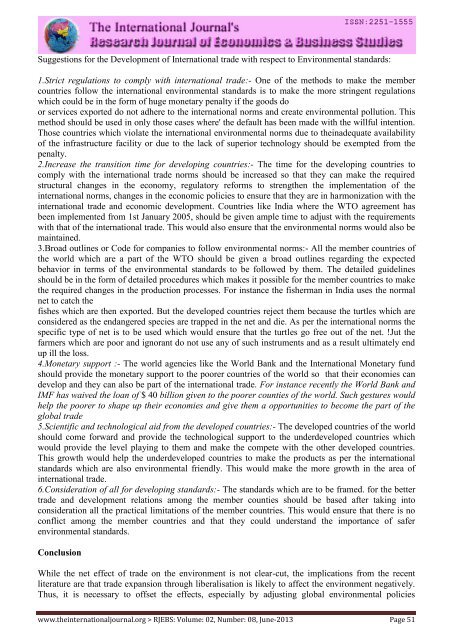Research Journal of Economics & Business Studies - RJEBS - The ...
Research Journal of Economics & Business Studies - RJEBS - The ...
Research Journal of Economics & Business Studies - RJEBS - The ...
- No tags were found...
Create successful ePaper yourself
Turn your PDF publications into a flip-book with our unique Google optimized e-Paper software.
Suggestions for the Development <strong>of</strong> International trade with respect to Environmental standards:<br />
1.Strict regulations to comply with international trade:- One <strong>of</strong> the methods to make the member<br />
countries follow the international environmental standards is to make the more stringent regulations<br />
which could be in the form <strong>of</strong> huge monetary penalty if the goods do<br />
or services exported do not adhere to the international norms and create environmental pollution. This<br />
method should be used in only those cases where' the default has been made with the willful intention.<br />
Those countries which violate the international environmental norms due to theinadequate availability<br />
<strong>of</strong> the infrastructure facility or due to the lack <strong>of</strong> superior technology should be exempted from the<br />
penalty.<br />
2.Increase the transition time for developing countries:- <strong>The</strong> time for the developing countries to<br />
comply with the international trade norms should be increased so that they can make the required<br />
structural changes in the economy, regulatory reforms to strengthen the implementation <strong>of</strong> the<br />
international norms, changes in the economic policies to ensure that they are in harmonization with the<br />
international trade and economic development. Countries like India where the WTO agreement has<br />
been implemented from 1st January 2005, should be given ample time to adjust with the requirements<br />
with that <strong>of</strong> the international trade. This would also ensure that the environmental norms would also be<br />
maintained.<br />
3.Broad outlines or Code for companies to follow environmental norms:- All the member countries <strong>of</strong><br />
the world which are a part <strong>of</strong> the WTO should be given a broad outlines regarding the expected<br />
behavior in terms <strong>of</strong> the environmental standards to be followed by them. <strong>The</strong> detailed guidelines<br />
should be in the form <strong>of</strong> detailed procedures which makes it possible for the member countries to make<br />
the required changes in the production processes. For instance the fisherman in India uses the normal<br />
net to catch the<br />
fishes which are then exported. But the developed countries reject them because the turtles which are<br />
considered as the endangered species are trapped in the net and die. As per the international norms the<br />
specific type <strong>of</strong> net is to be used which would ensure that the turtles go free out <strong>of</strong> the net. !Jut the<br />
farmers which are poor and ignorant do not use any <strong>of</strong> such instruments and as a result ultimately end<br />
up ill the loss.<br />
4.Monetary support :- <strong>The</strong> world agencies like the World Bank and the International Monetary fund<br />
should provide the monetary support to the poorer countries <strong>of</strong> the world so that their economies can<br />
develop and they can also be part <strong>of</strong> the international trade. For instance recently the World Bank and<br />
IMF has waived the loan <strong>of</strong> $ 40 billion given to the poorer counties <strong>of</strong> the world. Such gestures would<br />
help the poorer to shape up their economies and give them a opportunities to become the part <strong>of</strong> the<br />
global trade<br />
5.Scientific and technological aid from the developed countries:- <strong>The</strong> developed countries <strong>of</strong> the world<br />
should come forward and provide the technological support to the underdeveloped countries which<br />
would provide the level playing to them and make the compete with the other developed countries.<br />
This growth would help the underdeveloped countries to make the products as per the international<br />
standards which are also environmental friendly. This would make the more growth in the area <strong>of</strong><br />
international trade.<br />
6.Consideration <strong>of</strong> all for developing standards:- <strong>The</strong> standards which are to be framed. for the better<br />
trade and development relations among the member counties should be based after taking into<br />
consideration all the practical limitations <strong>of</strong> the member countries. This would ensure that there is no<br />
conflict among the member countries and that they could understand the importance <strong>of</strong> safer<br />
environmental standards.<br />
Conclusion<br />
While the net effect <strong>of</strong> trade on the environment is not clear-cut, the implications from the recent<br />
literature are that trade expansion through liberalisation is likely to affect the environment negatively.<br />
Thus, it is necessary to <strong>of</strong>fset the effects, especially by adjusting global environmental policies<br />
www.theinternationaljournal.org > <strong>RJEBS</strong>: Volume: 02, Number: 08, June-2013 Page 51

















